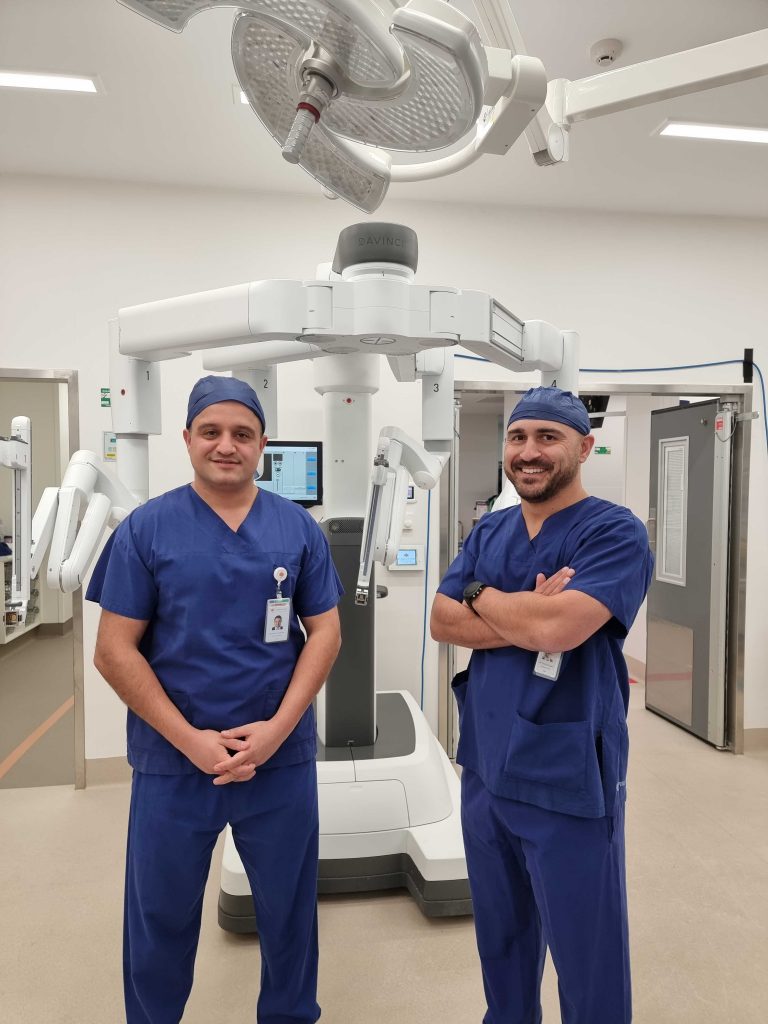What is renal colic?
Renal colic is a type of abdominal pain that occurs when a kidney stone blocks part of your urinary tract. Kidney stones can occur anywhere along the urinary tract, which includes the kidneys, ureters, the bladder, and the urethra. Kidney stones form when minerals in the urine clump together to form hard crystals. They can be very small (like a grain of sand), or they may be as big as a golf ball; as kidney stones grow larger they can cause significant pain and other urinary symptoms.
What are the symptoms of renal colic?
Usually, small stones don’t cause obvious symptoms, however larger stones can cause renal colic, particularly if they block one of the ureters. The ureters carry urine from the kidneys to the bladder.
Some common symptoms of renal colic include:
- Very strong pain along the side of the body between the ribs and the hip (referred to as flank pain) or in the lower abdomen
- Pain that can be felt in the back or in the groin
- Nausea and vomiting
- Pain that comes in waves, usually lasting between 20-60 minutes at a time.
Other symptoms of kidney stones include:
- Pain during urination
- Blood in the urine
- Cloudy urine or urine that smells abnormal due to infection
- Needing to urinate urgently or much more frequently
- Fever and chills (in cases of infection).
What causes renal colic?
Renal colic occurs when a kidney stone blocks a part of the urinary tract; quite often the blockage occurs in a ureter. The intense pain patients experience is usually caused by the stone causing inflammation and pressure build-up. Sometimes the ureters also spasm, causing pain.
Kidney stones and therefore renal colic are very common. The lifetime risk is about one in ten, with men being at high risk than women.
There are certain factors that can increase a person’s risk of developing kidney stones and suffering with renal colic. Some of these factors include:
- Dehydration
- Excess dietary salt
- Consuming a diet high in oxalates or animal proteins
- A family history of kidney stones
- Some metabolic disorders
- Urinary tract infections.
What how is renal colic treated?
If you have any symptoms of renal colic, you should seek prompt medical attention from your doctor or your specialist urologist. Your doctor will perform some tests to confirm whether you do have a kidney stone that is causing a blockage, and sometimes they will also determine what type of stone it is, prior to initiating treatment.

Medical or surgical treatment of renal colic will usually depend on the size, number, location and type of stone. There are four main types of kidney stones:
- Calcium stones
- Uric acid stones
- Cystine stones
- Struvite stones
Smaller stones can often be passed in the urine, with the help of certain medications.
If you do in fact have a large stone, your urologist may recommend one of the following treatments to remove it and relieve your renal colic:
- Extracorporeal shockwave lithotripsy (ESWL): a procedure that uses shockwaves targeted directly at the stone, to break it up into very small pieces which can then be passed through the urine
- Ureteroscopy: this procedure involves your urologist inserting a small camera through the urethra and into the bladderm, ureter or kidney to remove the stone
- Percutaneous nephrolithotomy: this is a procedure that is performed under general anaesthetic, where a small camera is inserted directly into the kidney through a small incision in your back to remove the stone. This is generally reserved for larger kidney stones
In the meantime, your doctor will also prescribe you some medications to relieve your renal colic pain.
Can you prevent renal colic?
Preventing renal colic is based upon preventing kidney stones in the first instance. After having one stone, the risk of getting another is up to 10% per year. Your urologist will discuss prevention strategies with you based upon your individual circumstances, however some general tips include:
- Drink plenty of water: aim to keep your urine a pale yellow colour and avoid dehydration. Proper hydration helps to dilute urine minerals and frequent urination helps to flush the bladder.
- Reduce dietary salt intake: the body gets rid of extra salt in the urine, taking with it calcium and other minerals, which increases the risk of stone formation.
- Add lemon juice to your water: the citrate that is found naturally in lemon juice may help to prevent some types of stones.
- Reduce consumption of animal proteins: diets high in red meats, poultry, eggs and seafood have been linked to increased levels of uric acid, which can increase chances of stone formation.
Written by Dr. Shekib Shahbaz and Dr. Tony de Sousa
References
Bultitude, M., Rees, J., (2012), Management of Renal Colic, BMJ, 325, [https://doi.org/10.1136/bmj.e5499], accessed 27/3/21.
Dawson, C. H., Tomson, C. R. V., (2012), Kidney stone disease: pathophysiology, investigation and medical treatment, Clinical Medicine, [https://www.ncbi.nlm.nih.gov/pmc/articles/PMC4953772/], accessed 27/3/21.
Kidney Health Australia, (2020), Kidney Stones, [https://kidney.org.au/your-kidneys/what-is-kidney-disease/types-of-kidney-disease/kidney-stones], accessed 27/3/21.
Reeves, T., Pietropaolo, A., Somani, B.K., (2020), Ureteroscopy and laser stone fragmentation is safe and tends to improve renal function in patients with chronic kidney disease: Prospective outcomes with a minimum follow-up of 6 months, journal of Endourology, 34(4),[https://pubmed.ncbi.nlm.nih.gov/31891664/], accessed 25/2/21.
